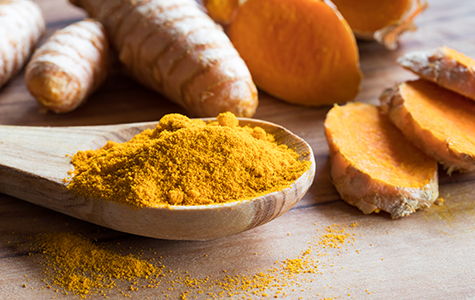Aproveche el poder de la cúrcuma
 Turmeric is an ancient spice best known for its use in curry and also gives mustard it’s bright yellow color. Turmeric’s uses, however, go beyond your bowl of chicken tikka masala.
Turmeric is an ancient spice best known for its use in curry and also gives mustard it’s bright yellow color. Turmeric’s uses, however, go beyond your bowl of chicken tikka masala.
Tumeric root, used in medicines for centuries, is being explored by scientist for a multitude of health benefits. The anti-inflammatory properties of curcumin, the yellow chemical compound derived from turmeric, are thought to be helpful in easing arthritis, digestive problems, possibly thwarting cancer and more recently, Alzheimer’s disease.
“Gold Standard” research with the gold-colored spice
A recent double-blind, placebo controlled study– scientists “gold standard” design for a research study showed that turmeric may impart protective benefits for brain health.
A group of researchers at the University of California, Los Angeles, wanted to test the effects of curcumin on memory and attention in adults who did not have moderate or advanced dementia. They studied 40 adults between the ages of 51 and 84, about half of whom took a curcumin supplement daily for 18 months the other half took a placebo or fake pill. Those who took the curcumin experienced improvement in memory and attention and a decrease of accumulation of beta-amyloid and tau protein-(the proteins associated with Alzheimer’s disease) in parts of the brain.
Since curcumin is relatively inexpensive, these are promising results. Keep in mind, however, this research warrants additional exploration to confirm its findings.
Other interesting research suggests that there is a lower rate of Alzheimer’s disease in India where curry is consumed daily but scientists think other social factors of Indian culture may also affect this finding.
Tips on Taking Turmeric
Turmeric can be consumed as a spice added to food such as soups, scrambled eggs, rice or vegetables. It also can be taken as a supplement. If you’re interested in adding some of this spice into your diet, here is some bright advice:
- If you’re buying a supplement, look for the words “phytosome technology” on the label. This manufacturing method helps improve the absorption rate of the turmeric in your body.
- Talk to your doctor about the right dose for you. Then, start at a lower dose and work your way up. Although uncommon, turmeric can cause digestive upset.
- Don’t settle for less. Use the authentic Indian spice for cooking. Use supplements containing as few inactive ingredients/fillers as possible.
- Only buy what you will use soon. Both the spice and the supplements become less effective the longer they sit and the more they are exposed to air.
- Continue to take your regular medicines as directed. Stop taking turmeric and talk to your doctor if you experience any ill effects.
https://health.clevelandclinic.org/7-tips-for-taking-turmeric-infographic/
Need ideas on to incorporate turmeric in your next meal? Try our recipe for Cauliflower Gold at https://healthybrains.org/cauliflower-gold/.









